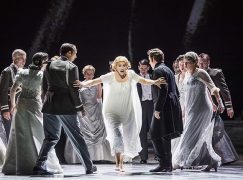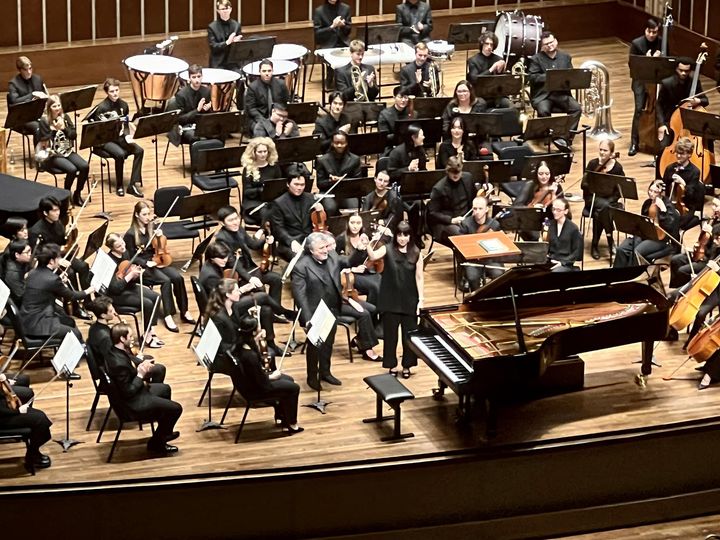Outrage to follow as Glyndebourne censors ‘offensive’ operas
NewsThe privately-owned Glyndebourne Festival has posted a radical ‘inclusion statement’ on its future productions plans.
Read carefully, then consider the consequences.
Some operas in our archive reflect the society and norms of previous ages, containing historical opinions and social assumptions which may offend audiences today. Where once exoticism and orientalism in the presentation of non-European cultures was acceptable, we recognise through our modern lens that this was wrong then and is wrong now. Moving forward we are committed to re-evaluating our approach to creating opera and interpreting its stories. At the same time, we will continue to make our historical performances available, as we believe they constitute a part of our legacy.
This is censorship, plain and simple.
At the simplest level, it patronises the audience by saying ‘we will make up your mind for you before you can possibly be disturbed’.
At a more troubling dimension, it completely undermines the purpose of art which is to stimulate, uplift, entertain, provoke and enrage.
Consider the operas Glyndebourne will have to edit for likely offence.
No child killing in Jenufa and Peter Grimes, two Glyndebourne staples.
No sexual flaunting in Carmen.
No #Metoo in Don Giovanni.
No wife killing in Otello.
The list is endless.
Would you ever go and see an opera that has been tampered with to avoid giving offence?
image: Handel’s Saul at Glyndebourne, 2018, courtesy Glyndebourne Productions






Bravo Glyndebourne.
It’s not censorship.
It is saying ‘we’re not putting on a problematic opera production without acknowledging those elements that are uncomfortable and exploring what we can do about it’.
Productions are always interpretations, regularly change settings and time periods etc. It’s saying, lets look at what we do when we interpret an opera, and what role we have in perpetuating discriminatory ideas. What imaginative solutions might be opened up when we question this – this is exciting.
Opera isn’t static – the way its put on changes over time, and this is just part of it.
Oh, please. There’s a great deal that makes me “uncomfortable” but I don’t require that everyone else feel the same way and conform to my feelings. It’s called being an adult.
I don’t know if a leftist high horse is any better, any less obnoxious, than what other people prefer or are more comfortable with. Incidentally, Mao Tse-tung in the 1960s was into his own version of re-writing the past and stomping on Chinese culture and traditions. Or his so-called Cultural Revolution.
So, Glyndebourne, I assume you will soon put on all-inclusive, family-friendly Drag Queen show?
Obviously, you are not trying to avoid offence. You are going woke.
How many of your (former) patrons are outraged on social media, because of the current thing?
Only vegan picnic baskets allowed?
I guess Leonard Bernstein and Tatiana Troyanos ought to be cancelled, owing to the imperialism of “I like to be in America”, or racism regarding Puerto Rico.
West Side Story is such a western narrative, burn it?
Oh, dear! No imperialism or religious intolerance in Handel operas?
“Would you ever go and see an opera that has been tampered with to avoid giving offence?”
Well. I went and saw several operas that have been tampered with to *give* offense.
Like Alexander the Great doing his field marshal.
¯_(ツ)_/¯
I suspect that this is meant in relation to their productions – not necessarily the operas themselves. In the same way the ROH has had to relook at how Japanese culture was (stereotypically) portrayed in its recent revival of their production of Butterfly.
At no point does Glyndebourne mention editing works or censorship.
Except there is nothing actually stereotypical in Butterfly, and Puccini went to extremes to consult experts in Japanese culture and customs to have them faithfully represented on stage. A historical representation of Victorian Age Japan does NOT have to be viewed as a commentary on Japan in our times. If people would put energy into research and understanding what they are seeing rather than their misguided emotions, the world might function just a tad bit better.
Absolutely!
Going off at a tangent: what do the pointed finger gestures in the Chinese Dance in the Nutcracker signify? Imitation of a traditional Mongolian chopstick dance? Er, no. Or maybe 笄 (Ji), the term used for hairpins of the Qin dynasty. Er, also not.
Answers anybody? (There is another quite plausible one.)
Answer, in case anyone is still reading this thread or is interested or both:
A tradition of master ceramicists in this cultural context. It was only they who could render a slender pointed finger on a raised hand and ensure the figure survived firing.
It’s been so bad there so
I won’t miss it but this is just the most pathetic I l have heard in a long time – another way to lose audiences as the youngsters are definitely not interested in such hideous attitude
It sounds as though Glyndebourne is planning to present only ‘historical performances’ that have been eviscerated (sorry – too violent), and modern works that lack any potentially ‘offensive’ content. I presume this means no wronged women (including plotting by one woman against another), violence (even minor), or wars (no matter how long ago) for a start. I wish them the best of luck in selling tickets to such an anodyne programme!!
I don’t see anything about censorship in their statement. To me it read more as a declaration that productions will downplay or contextualize elements that are patently offensive by today’s standards and mores. Just as we rarely see old movies on TV with blackface anymore (at least here in the U.S.), some operas are just too loaded with racist or sexist baggage to be staged on face value.
Every production is about making editorial choices. Calling it censorship seems inflammatory.
Inflammatory? On slippedisc? I’m shocked, shocked!
We’re British and we say it as it is! It’s censorship. And then at a time when ENO is fighting for its existence.
Who is the royal “we” that you’re talking about?
Then again, for a country that voted for Brexit, it doesn’t surprise me that racial stereotypes in art don’t bother you/them.
The fawning statement admittedly does not mention the word “censorship”, but it would be hugely naïf to believe that art there will not in future be distorted to fit the woke brigade.
Note the plethora of red flags: “society”, “norms of previous ages”, “historical opinions”, “social assumptions”, “offend”, “exoticism”, “orientalism”, “non-European cultures”, “modern lens”, “approach”, “reevaluating”,”creating”, “interpreting”, “available”, and “legacy”.
Add in the meaningless linguistic tick “moving forward” and we know what is coming.
Anyway, who exactly has been offended by, say, Butterfly? If anyone is being caricatured, it is Pinkterton, the all American guy. Blummy!
Give us a break, Glyndebourne! The only “wrong” thing in art is the lack of talent.
I guess “Cosi fan tutte” is out, then?
Same as Die Entführung aus dem Serail, Tannhäuser, Walküre, Salome, Elektra, Enescu’s Œdipe, Lady Macbeth of Mtsensk, The Death of Klinghoffer, etc.
What’s wrong with exoticism and Orientalism? It wasn’t wrong then and it’s not wrong now. They are legitimate fields of study and art. These woke dopes need to get over themselves.
May I refer you to Edward Said’s landmark book ‘Orientalism’ from the late 1970s. There’s nearly 50 years of common knowledge about this and the denial like this is crazy.
Certainly you may.
But to gloss a commentary on the book by renowned historian Nikki Keddie, scholars of Middle East Studies have unfortunately adopted the word ‘orientalism’ as a kind of expletive. It rapidly became a substitute for clear analysis of sources and is now a meaningless slogan.
Said. Vastly overrated.
Edward Said was an anti-Semitic supporter of terrorists. Enough said.
Wait ‘till you read about Wagner!
This post is projecting. What they have actually done is insulated themselves against complaints about some of these matters in their historical legacy productions on video by stressing that the manner of depiction is not what they might choose now. No talk of censoring or bowdlerizing current works that I can see.
This should bring all the young and underprivileged to the picnic.
Where is there anything that says they are “censoring” or changing the operas in any way? In fact, “we will continue to make them available, as we believe they constitute part of our legacy” suggests the exact opposite.
Once again, opponents of “cancel culture” are so devoid of actual examples they have to invent some to fuel their outrage.
You missed removing Albanians from Così fan Tutte and possibly a rape or two from Don Giovanni…
Dismay. Anger. Upset. Despair at the condescension, the presumptuousness, the fear of open discussion.
What the f…?
No more incest in Walkuere. Or Cosbyesque drugging of lovers in Tristan. No more slaves in Aida. No more British imperialism in Maria Stuarda (quick, rewrite Schiller). No Porgy and Bess performed in Gershwin’s offensive “Negro” patois – better in Esperanto.
The woke scion of this private opera enterprise effectively pronounces on the rules for culture to be applied to the plebes being entertained at his grand estate. WHY? It’s his right to do so. But WHY? Have bejeweled patrons and musicaly literate urban mobs been marching with torches at the country manse demanding immediate editing? Is this generation of Christies possibly atoning for sins of the forefathers? (Where DID that old money come from?)
If we edit the text, the scene, surely we must also edit the music itself. For certain sounds, instruments must surely be offensive. Beckmesser’s music to be rewritten? Carmen’s music is blatantly mocking of gypsies – and so must be revised by Glyndebourne commissars.
The mind boggles at the limited mental capacity at Glyndebourne that created this boilerplate PR dribble and opened this can of proverbial – dare we say it without offending – worms !!
In a world of Truss idiocy, Putin evil, Trump fascism, and raging immigration and looming class warfare we worry about sanitizing Mme. Butterfly.
Very troubling. Another institution falls to ‘woke’. How sad.
To think that the late Supreme Court Justice with impeccable liberal bona-fides, Ruth Bader Ginsburg, had the audacity to say Don Giovanni was her favorite opera!
Completely agree with this article. Yes, the list is endless.
At the bedrock of this activism is the infantilization of the people, which now seems complete.
Please do not leave off your list “Salome”, with all its gore and misogyny!! The kiddies would be way past their bedtimes anyway.
Like the time ENO forced Simon McBurney to change Papageno‘s Suicide in Magic Flute? More good news for English elitism in opera: not only cut to bits financially, but now deformed by woke neo-liberalism, masking the big fears of lesser talented white men – still in charge. Men who use words like „diversity“ to manipulate their power. What a load of monkeys we look to the rest of the world now: well done Brexit. This all goes back to you.
If you think Brexit is responsible for this tsunami of woke diarrhoea then you need help.
NL is a skilled rabble-rouser. That is one reason why SD can be fun to read.
HOWEVER….
Most of the comments here, and most of the “likes” and “dislikes”, suggest to me that people have failed to read Glyndebourne’s statement carefully enough. It’s great that Glyndebourne has preserved so many of its past performances for posterity. Of course, some of those productions incorporate attitudes and perceptions that have latterly, and rightly, come to be challenged. That doesn’t justify censoring those productions, of course, as the statement makes clear.
Glyndebourne’s statement is no different from the RSC saying “plays such as The Taming of the Shrew and The Merchant of Venice raise some problematic issues, but that doesn’t mean we’re going to censor them: we will just try to present them in a way that will not offend any sections of our 21st-century audience.”
There will always be some people who will be offended by the very act of mounting a given play or opera, regardless of the details and presentation of the production. Some taboos have even arisen over the entire output of a given composer for reasons unrelated to the output itself (e.g.: the taboo on Wagner in Israel is attributable to the composer’s antisemitism and the fact that, long after he had died, he was lauded by the Nazis). And that is before even considering the fact that worthwhile artistic endeavour will often be offensive to some people. The paramount consideration has to be presenting great art, not avoiding offence at any cost.
They’re implying elements their previous productions may cause offence to today’s younger audience members, so would take measures to make sure that wouldn’t happen in the future. That ultimately sounds like censorship.
Go woke, go broke…..watch this space
Congratulations to Emil, Ellie, Christoph, Kamal Khan and M Le Balai for reading the Glyndebourne press release. Guys, let’s make up a party and go to something there next summer. Email NL if you like that idea.
Nearly everyone else fell for NL’s spin and gave a tiresome anti-woke knee-jerk response.
Anything in which Danielle can dance and occasionally sing is fine. The music and story do not matter that much.
The image of course is not from Saul, but Vanessa. It’s amazing that you made a whole sordid article from a website disclaimer.
I do not object to “offensive” themes and/or content. It’s drama. BUT the real offense is taking opera and “modernizing” the casting, the costumes, the situations (placing Renaissance opera in WWII or Harlem!) to pretend it is more “relevant” is gross betrayal and perversion. Othello was a very dark skinned Moor; Aida was black and Amneris was NOT black but Egyptian! Want those “stories” to be different, write your own operas don’t destroy classics (even when we all know there is no desert in Louisiana!).
The image is from Vanessa, not Saul.